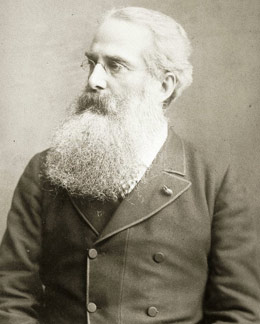|
MUSINGS:
What's in a name?
by Padma Edirisinghe
The field of nomenclature in our island is indeed a fascinating area
to explore, further providing a mirror to her rich diversity as regards
her population make-up, even going on to astonish those alien to this
aspect. For example, that leading mentor in our Buddhist renaissance
movement, Colonel Henry Olcott had once protested at leadership being
conferred on two Portuguese in a Buddhist procession. But soon he was
informed that the two were staunch Buddhists who only carried alien
names germaine to the Iberian peninsula.
A fact rather unknown is that one of our famed literati, Alagiyawanna
Mohotti was officially entrusted by the Porto administration, with this
changing of names. I too was enlightened about this fact while attending
a felicitation ceremony of Lanka's literati who lived and live in a
rather obscure part of the island.
|

Colonel Henry Olcott.
pic: www.theosophical.org |
Geographically and according to the territorial divisions of the time
hailing from Dutch times, this area coincided with the rubber infested
terrain that was sited between Thun Korale and Siyane Korale. Remember,
I had to get my facts straight for I was representing the Ministry of
Education at this gathering. Among those felicitated that day (including
the dead and the living ) were K. Jayatileka, Mahagama Sekera and
Alagiyiyawanne Mukaveti.
Figure
This last was a figure rather unknown to me except for the facts that
he authored Kustahntheenu Hatana, the only Sinhala work that glorified a
Portuguese general, Constantine De Saa by name. It was evident that the
author was stooging to the foreign rule and that he himself had embraced
the Xtian faith for he invokes the blessings of Jesus at the beginning
of this Hatan Kavya or war panegyric.
The traditional mode at the beginning of a literary production was to
invoke the blessings of Thisarana or the Three Gems which was rudely
overlooked in this instance and grossly substituted. I had known these
facts earlier.
What I learnt at that function when odes were sung to these writers
(never mind the traitor acts of some), that certain roles they played
too were highlighted. For example, Alagiyawanna Mohotti, in recognition
of his literary potential had been made a high state officer and one of
these was conferring names to the nameless.
Interestingly or not so interestingly, society had got so dishevelled
at this time owing to centuries of tri-power conflict among the Dutch,
the Portuguese and the Sinhala factions that many did not own names. It
also led to a phenomenon when several shared a common name as Banda and
Menika. This proved a headache to the Porto administrators and so was
begun a campaign for issuing new names that naturally smacked of Xtian
flavour.
A drama was enacted around the situations regarding this name
changing process, one of which I remember for its sheer frivolity.
Students of Radawana School dressed as Portuguese officials were dishing
out names as Perera and Silva and Boteju and Gomez till the very stock
of names was coming to an end and the officers were putting in order
their files when a group of Sinhalese walked in late to obtain their
names. But all names were over and the head haughtily bellowed, the
Portuguese word for GET OUT which that group mistaking it for a name
carry on yet. Such was the drama of bestowing names.
Practice
Besides the Vasagam and Ge names endemic to Sinhala society, there
were also titular names conferred as Don and Dona which were held in
high regard and usually given to the highest caste. In fact the
Portuguese had carried out this practice in India too and so much
weightage was given to these names that some had bought them at very
high prices. Anyway this practice of buying titular names had not been
adopted here but some sort of adoption of names took place when many
Sinhala men and women of Kotte area and maritime areas went over to the
new faith and this conversion was followed by change of names leading to
a seething plethora of Pereras, Fernandos, Diazes, Gomezes, Peirises and
Silvas. Today many opt to adopt local names and discard the alien names.
Before concluding, these two facts need mention. Name changing in the
highlands was much less prevalent since there were fewer conversions and
fewer social upheavals, the traditional society remaining more or less
static. But electoral lists in the Kandyan areas reveal a strange
phenomenon when purchasers of land from the upcountry bought them along
with the vasagam or Ge name of the former owner. Hence, Innawela
Mudianselage Lebbe.
After all, WHAT IS IN A NAME?
"A rose would have smelled just as sweet, if called by any other
name."
IT IS THE HUMAN THAT MATTERS.
And I cannot refrain from mentioning something a Lankan visitor to
Portugal had made when perusing the Porto directory. It contained fewer
Pereras and Fernandos and Silvas than our directory! |

